Escalating trade tensions, particularly between the United States and China, are not only shaking up global markets but also prompting a potential shift towards blockchain technology. Executives from Truebit, a blockchain network, suggest that these trade wars could lead governments to embrace Web3 solutions to enhance transparency and fairness in international trade.
Key Takeaways
- Trade wars are creating new use cases for blockchain technology.
- Truebit executives believe blockchain can ensure fair application of tariffs.
- The proposed tariffs could impact $2.4 trillion worth of imports.
- Truebit is exploring partnerships with software vendors servicing governments.
- Trade tensions pose risks to the integrity and accessibility of blockchain networks.
The Impact of Trade Wars on Blockchain Adoption
The recent announcement by President Donald Trump regarding sweeping tariffs on U.S. imports has raised concerns about a potential global trade war. While the immediate effects are being felt in financial markets, the long-term implications could be significant for the adoption of blockchain technologies.
Truebit’s Chief Technology Officer, Federico Kattan, emphasized that blockchain can play a crucial role in proving the provenance of goods. This is particularly important in a trade environment where companies might attempt to circumvent tariffs by misrepresenting the origin of their products. For instance, a product assembled in a low-tariff country could be falsely labeled to avoid higher tariffs when entering the U.S.
How Blockchain Enhances Supply Chain Transparency
Blockchain technology offers a solution to enhance supply chain transparency through:
- Immutable Public Ledger: Every transaction is recorded on a public ledger, making it nearly impossible to alter or falsify data.
- Provenance Tracking: Companies can verify the origin of their products, ensuring compliance with tariff regulations.
- Fraud Reduction: By limiting the scope for fraud, blockchain can protect trillions of dollars worth of imported goods.
Truebit’s Role in the Evolving Landscape
Truebit, which specializes in trustless verification for various applications, is already in discussions with software vendors that interface with the U.S. government. They are also involved in a European Union-funded project exploring the potential of Web3 in global supply chains. CEO Jason Teutsch noted, "We’re not yet talking directly to governments, but to the software vendors trying to interface with them — because that’s where we want to be."
Despite the potential benefits, Truebit’s native token, launched in 2021, has faced challenges, with a market capitalization of around $20 million. The company aims to leverage the current trade tensions to position itself as a key player in the blockchain space.
Risks Associated with Trade Wars
While the adoption of blockchain could be accelerated by trade wars, several executives have raised concerns about the risks involved. Nicholas Roberts-Huntley, CEO of Concrete & Glow Finance, warned that aggressive tariffs and retaliatory policies could disrupt the physical infrastructure of blockchain networks. Key risks include:
- Obstacles for Node Operators: Increased tariffs could hinder the operations of node operators and validators.
- Fragmented Regulatory Regimes: Different countries may impose varying regulations, complicating compliance for blockchain networks.
- User Censorship: Trade tensions could lead to increased censorship of users in affected regions.
Conclusion
As trade wars continue to evolve, the potential for blockchain technology to provide solutions for transparency and fairness in international trade becomes increasingly relevant. Companies like Truebit are at the forefront of this shift, exploring how Web3 can be integrated into government operations to navigate the complexities of global trade. However, the associated risks must be carefully managed to ensure the integrity and accessibility of blockchain networks in this turbulent environment.








